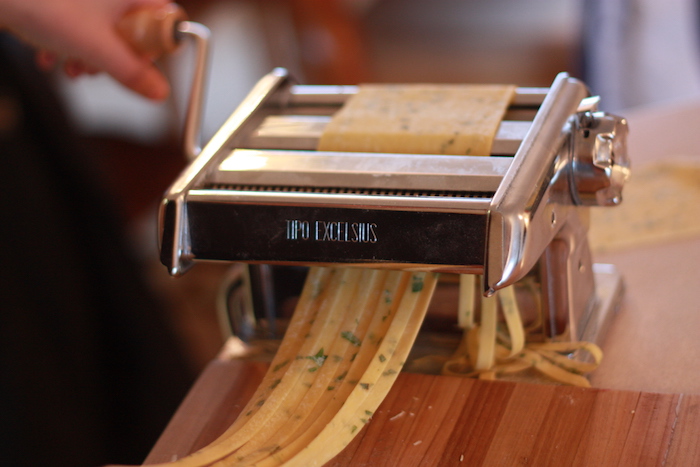We made pasta. From scratch. It didn’t require specialized knowledge or rare skills. It was easy, fun and I recommend you try it, too. We had fresh pasta for dinner that day. And we’ve eaten from our frozen reserves since.
Before we get into it, it was Episode One of the Netflix original Chef’s Table that inspired us to do it. Chef Massimo Bottura‘s love of Italian food and his creativity with it inspired us to dabble using the recipe books we had in our house.
We added extra eggs, but otherwise followed Chef David Lebovitz’s recipe for pasta in My Paris Kitchen to the letter.
Herbed fresh pasta (serves 4 – 6)
- 1 1/2 cups semolina
- 1 1/2 cups all-purpose flour
- 1/2 teaspoon sea salt or kosher salt
- 1/2 cup mixed chopped fresh herbs, such as parsley, sage, rosemary, thyme, and oregano
- 3 large eggs, at room temperature (we needed five, but ours are farm fresh, which may and presumably does make a difference)
- 3 large egg yolks
- Water (if needed – optional)
- Rice flour or additional semolina, for rolling
Mix the semolina, flour, salt and herbs in a bowl. Spill the blend onto your counter. We did so onto a large cutting board. Carve out a well in the centre of the mixture and add your eggs to the cavity.


Begin whisking the eggs together, taking in small amounts of flour from the edges of cavity. Do this until it becomes difficult to mix with a fork or small whisk. At this point, some turn to a more robust mixing implement, such as a scraper to ensure all the bits sticking to the counter are incorporated into the blend.

Fold the dough into itself, mixing and kneading the ball until it’s smooth and doesn’t crack under the pressure of your hand (about three minutes). It was during this process we decided to add more eggs. More water and flour can also be added at this time.

Push the dough into a one-inch-thick disk and wrap in plastic, letting in rest at room temperature for about one hour.
Divide the dough into eight pieces on a floured surface, flattening each wedge into a rectangle. Pass the flattened piece through the pasta machine at the widest setting, fold it, then pass it through again. Send the dough through the machine three more times decreasing the width setting each time.


Once the dough is at your preferred thickness (it’ll be a long run of dough by now), run the strip through the desired cutting attachment.

Place cut pasta on a baking sheet and lightly dust the noodles with flour and toss, to ensure even coverage. We set aside what we were going to eat that day, freezing the rest in single serving floured coils. Cook noodles in boiling water for between four and six minutes, depending on thickness.

Enjoy. They’re delicious!
***
Toban Dyck is a writer and farmer living in southern Manitoba.
